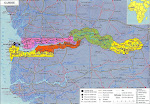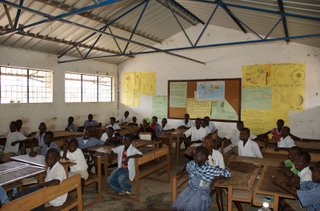While visiting in Brikama with Ebrima Sarr, my host, he took me to Jaliba's compound. We were met there by the drummer, Baba. Baba said that Jaliba's group would be practicing at four and that we should come back at 3:30. He also said that any musicians who were late to practice had to pay a fine.
We returned at 3:30 and had the pleasure of watching jeli children playing the instruments while the crew set up. I'll soon add photos if I can figure out how to do it. It was amazing how there were babies under a year who kept wanting to drum. Their mom's would take them to the three sabar and they would beat them with a stick. (Those drums are often played with one hand and one stick.)At least two of Jaliba's sons played the kora and sang. I had the pleasure of playing the balafon for a bit. Not West African tunes, just a couple originals.
Time passed and finally at five fifteen, Jaliba showed up! Guess the fine doesn't apply to him. He did go eat before he joined practice! The rehearsal reminded me of a few I've heard at home - Jeliba telling people how he'd like them to change what they were playing. Everyone was pleasant, no cross words, just men working together on four songs.
After hearing them, I see why people here consider Jaliba the top performer. He playes while he sings and dances and he is active in social causes.
Friday, January 23, 2009
Thursday, January 15, 2009
Griot - Jeli
I'd mentioned that there would be more about the term Griot. Rather than putting it in my own words before I visit the country, I'd rather quote from Eric Cherry, in his book, Mande Music. "The Maninka term Jeli (in Mandinka they are called Jalis) refers to a type of musical and verbal artist. Jelis are somewhat like the bards of old Europe. They are story teller, historians and musicians and yet more than this. Not just anybody can be Jeli. They are highly trained individuals and the skills are handed down through generations of specific families. Jelis have the exlusive right to play the kora, the bala (balafon) and the Koni. In certain areas Jelis also play the Jeli dundun and the tama. It is their role to sing and recount Mande social & politcal life.
They are praise singers and often encourage people to act. It is said that they can mould actions out or music in much the same way a blacksmith can mould useful things out of metal.
There are 3 fields of speciality for Jelis
* Speech (kuma) - This usually consists of history, stories, geneologies and proverbs.
* Song (Donkili) - Melodies and lyrics.
* Instrument playing (Maninka: foli, Mandinka: kosiri).
Each skill has completely different training and the end result is high specialisation whichever is chosen. Most males are skilled in 2 of these areas. Females are generally singers. Certain family names are Jeli, such as Cissokho, Koyate, Conte and Diabate." Others in The Gambia are Jobarteh, Susso, Suso, Saho, Kanuteh, Konte, & Konteh.
They are praise singers and often encourage people to act. It is said that they can mould actions out or music in much the same way a blacksmith can mould useful things out of metal.
There are 3 fields of speciality for Jelis
* Speech (kuma) - This usually consists of history, stories, geneologies and proverbs.
* Song (Donkili) - Melodies and lyrics.
* Instrument playing (Maninka: foli, Mandinka: kosiri).
Each skill has completely different training and the end result is high specialisation whichever is chosen. Most males are skilled in 2 of these areas. Females are generally singers. Certain family names are Jeli, such as Cissokho, Koyate, Conte and Diabate." Others in The Gambia are Jobarteh, Susso, Suso, Saho, Kanuteh, Konte, & Konteh.
Monday, January 12, 2009
Jolly Phonics
In my teaching of English to third through sixth grade, I've been asked to use a British program called Jolly Phonics. It contains a song that all of you probably learned in school. I'm trying to learn it this new way! Check it out.
Monday, January 5, 2009
The Kora
Here, not only does one of the master kora players,Toumani Diabate, describe how to play the instrument, but you also get to hear it played with the balafon (marimba), djembe, ngoni, sabar, ntama, guitar, and other instruments. Near the beginning, you see the balafon from underneath. Watch for the small gourd under each wooden key. The sound resonates through those gourds. Each gourd has one or more holes drilled in it and then covered. The covering used to be made from spider egg cases. Nowadays cigarette papers are used.
Ry Cooder has played piano and guitar with this group.
If you'd like to personally hear this man, Toumani Diabate is playing on April 10, 2009 with the Bela fleck group at the University of Pennsylvania.
Ry Cooder has played piano and guitar with this group.
If you'd like to personally hear this man, Toumani Diabate is playing on April 10, 2009 with the Bela fleck group at the University of Pennsylvania.
Sunday, January 4, 2009
M'balax music
M'balax ( balax, Mballax, Mbalakh, Ndaga, Ndagga) music began in the 1970's in The Gambia and Senegal as a fusion of popular Western music and dance such as jazz, soul, Latin (especially Cuban) and rock blended with sabar, the traditional polyrhythmic drumming and dance music of the area. Dancers used moves associated with the sabar rhythms. Some of the first to popularize this music were Youssou N'Dour, Baaba Maal Thione Seck and Omar Pene.
In this video you can see the sabar drums (hit with one hand and one stick) join today's instruments.
In this video you can see the sabar drums (hit with one hand and one stick) join today's instruments.
Friday, January 2, 2009
Music Weekends continued.
The next video is Pa Bobo's brother, Tata Dindin Jobarteh singing his composition, "One Love" with his Salam band. In it you can see a riti player. The riti is a one stringed instrument. You'll also see a stilt dancer and what I believe is a masquerade called a Kankurang. He is an individual who wears a mask made of the bark and red fibre of the faara tree.
Thursday, January 1, 2009
Music Weekends
Because people attend mosque on Friday afternoons, school is only held for four and a half days in The Gambia. That means I'll be able to travel somewhere by gelleh gelleh (bush taxi)beginning Friday afternoons. At present I plan to spend many weekends in Brikama which is the music center of the country. I've studied West African drumming for the past seven years, but most of my teachers are from Guinea. That means I'll be exposed to a lot of new music.
In preparation for my trip, I've been listening to music from The Gambia. I find myself loving the sound of the Kora, The Gambia's national instrument. I am so intrigued by it, that I've decided to take a few lessons in order to understand the basic technique. The kora is a Mandinkan harp-lute type instrument made from a large calabash, a rosewood pole and 21 strings which today are made from fishing line.
I'll be taking lessons from Pa Bobo Jobarteh who comes from a long line of Griot. (Griot or jeli will be the subject of a later entry.)
I'm attaching two YouTube entries. The one is of Pa Bobo playing in a compound. This may be where I take a lesson. Wherever it is, I probably can meet his brother Tata Dindin who is also a well-known kora player and also his father Malamini who was the manager of the Gambia National Troup and of course plays kora.
Right now, a song that PaBobo composed, Peace, Love and Unity has become an unofficial national anthem of The Gambia. (Second video. Sung by another griot, Lamin Saho.) If you'd like to see more about Pa Bobo and his family, check out his site at www.kairakundaarts.org.
Subscribe to:
Posts (Atom)






